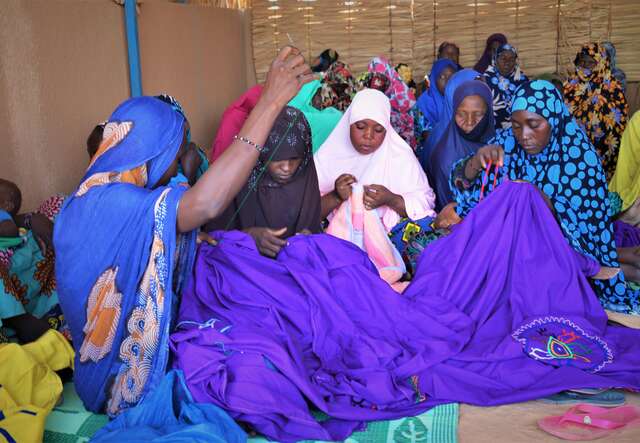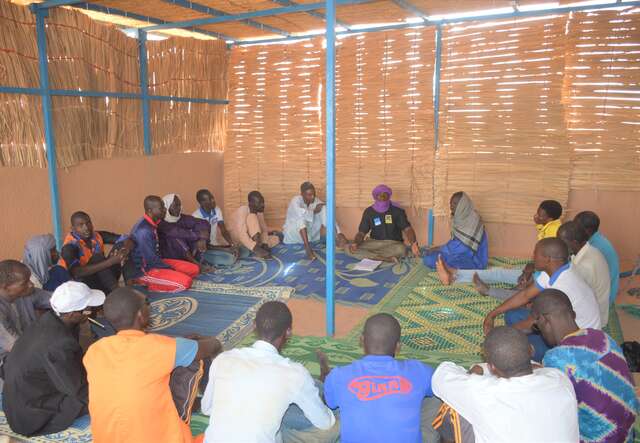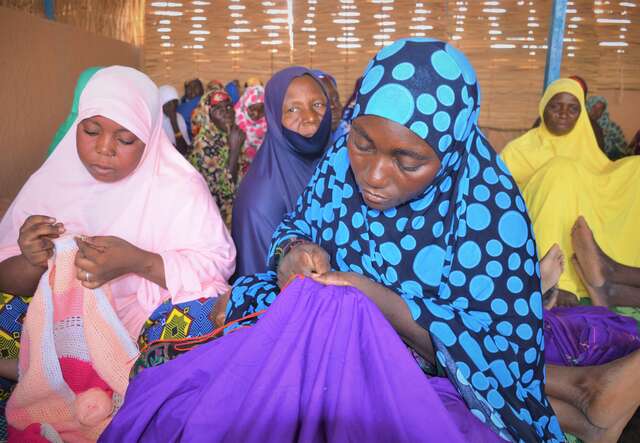How a Nigerien dad is advocating for gender equality in displaced communities
Boubacar Tahirou has experienced both unimaginable loss and remarkable transformation in his 45 years.
Boubacar Tahirou has experienced both unimaginable loss and remarkable transformation in his 45 years.
Boubacar Tahirou has experienced both unimaginable loss and remarkable transformation in his 45 years. Unrest in his home village in Niger forced him to flee his peaceful farming life and start anew amid displacement.
In addition to rebuilding his own life, Boubacar currently serves as a leader of an EMAP (Engaging Men in Accountable Practices) program with the International Rescue Committee — educating and engaging the men in his community in protecting women and girls from gender-based violence.
Boubacar was once a successful farmer and gold miner. He and his brother owned and managed extensive livestock—over 100 animals, including cows, donkeys and more. But their peaceful farm life was shattered when armed bandits began targeting villages like theirs. When insecurity escalated, he realized he faced two choices: stay and face death, or flee and risk everything.
Boubacar made the heart-wrenching decision to leave his home, starting a dangerous journey with his family to a refugee camp more than 140 kilometers away. On the way, they were attacked and his brother was tragically killed.
By the time they reached the displacement site, Boubacar’s life had changed dramatically. He no longer enjoyed the security he once had in farming and survival has become a daily struggle.
"I manage to get by," he says. "But it’s still difficult without a job. When I can pay for food, I do. When I can't, I have to look for credit, which isn’t always available." Yet despite his own struggles, Boubacar came to recognize that women and girls faced unique and disproportionate difficulties due to displacement — and became a leader in the IRC’s EMAP (Engaging Men in Accountable Practices) program.

Thanks to funding from the European Union, the EMAP (Engaging Men in Accountable Practices) program helps address gender inequality and gender-based violence by changing men’s perspectives on gender roles in the household and society.
In communities where traditional gender norms dominate, EMAP teaches men about the unique struggles women and girls face in displacement, about women’s rights and responsibilities, and about how they can support them.
In the Tillaberi region in western Niger, where Boubacar and his family live, women and girls face heightened vulnerability to gender-based violence (GBV). In Niger, 38.2% of women experience some form of GBV, including domestic and sexual violence or forced marriage. Women often face harassment in their homes, on their way to market, or while collecting firewood. Moreover, women are frequently excluded from decision-making roles, leaving them isolated and powerless.
"Women and girls have difficulty accessing employment, and have more tasks to perform, including household chores such as collecting firewood for cooking. It also emerged that women are not very involved in household decisions," he says.
In his new home, Boubacar saw firsthand how gender inequality exacerbates the struggles of being displaced. Women have limited access to employment and are burdened with heavy household chores. Many lack the agency to make decisions about their health, finances, or their roles in the family. And this inequality has worsened as conflict and displacement increase their vulnerability to exploitation.

Boubacar believes the EMAP program is making a difference. Women are speaking out more about their struggles, and many come to him for support regarding their relationships and roles at home.
He’s determined to ensure women’s voices are heard and that men become active allies in supporting women’s rights. "Only by respecting women’s rights can our community begin to heal and rebuild," he says. “The EMAP training has opened my mind. Now, I can share this knowledge with others to create a better life for everyone."
The changes Boubacar has made in his own life, such as sharing household responsibilities and teaching his children about respect, are small but significant steps toward creating a more balanced community. Boubacar believes that the future of his community depends on greater respect for women’s needs and a shift toward more equitable relationships.

Boubacar’s story is one of survival, resilience, and a commitment to building a better future. Despite the hardships of displacement, he has become an agent of change, working toward a more peaceful and equitable future.
His journey also underscores the broader need for protection services, education, and awareness to support women and girls, and to combat gender-based violence in displacement settings.
EU funded IRC programs like EMAP play a crucial role in addressing both immediate needs and shaping long-term cultural change. They don’t just empower men, but help create environments where women and girls are safe, valued, and can access their rights. As Boubacar and his community continue to navigate the complexities of their new lives, their commitment to building a better future remains unwavering.